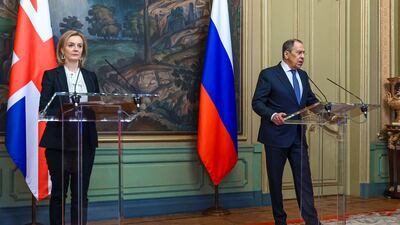The UK's new prime minister, Liz Truss, has been in power only a day, but she is already running out of time. So grave are the problems Britain faces. Inflation has hit double digits and energy bills are set to rise by 80 per cent next month. More crises are brewing at home and abroad.
She will need to muster all the experience she has to overcome these difficulties, particularly from her time as foreign secretary, a position she gave up on Monday. James Callaghan was the last prime minister to go straight from the Foreign Office to 10 Downing Street, almost 50 years ago. There are other interesting parallels between the two. Callaghan took power at the height of Britain's dysfunctional "sick man of Europe" phase between the late 1960s and 70s, a label brought about by the poor state of its economy.
Margaret Thatcher followed Callaghan as prime minister. She is a Conservative Party hero, credited by many with turning the fortunes of the country around and defending it abroad. In August, Ms Truss said of the Thatcher era that “Britain was one of the first countries to really reform regulation and create privatised utilities – we did great things in the 1980s”.
Ms Truss will be hoping she can shape the 2020s in a similar manner, and she will undoubtedly be thinking of the Iron Lady in these first, critical days of her premiership. If she can manage her incredibly difficult portfolio successfully she will get the same historic recognition.
Doing so, however, will require looking abroad at a time when it might be compelling to focus on home. The UK's domestic problems are, after all, in large part the product of a malfunctioning world.
Fortunately, Ms Truss has already demonstrated some capability when it comes to engaging with the world. She has been an advocate for a global Britain in the post-Brexit era and during her time as international trade minister important approaches were made for new trade deals.
Unfortunately, today's global agenda is far less about realising an optimistic future and far more about managing worsening crises. The Ukraine conflict requires negotiations between Ukraine and Russia as soon as possible, the green agenda must stay on track and tensions between the West and China should also be reduced.
The Middle East matters to Ms Truss's quest, too. Its stability is crucial for global stability, from energy security to the freedom of movement in its seas.
Ms Truss's predecessor, Boris Johnson, had many supporters abroad, not least in Ukraine where a street in the capital is now named after him. It was a different picture at home. His final days in office were riddled with accusations of mismanagement and misconduct.
The shape in which he found himself handing over power to Ms Truss should serve as a lesson in how to be a leader in unstable times. It is possible to be liked abroad, but it means little if your vision and conduct is poorly received at home. Ms Truss must seize the chance she now has to pursue a foreign policy that builds bridges and promotes peace abroad, and, while doing that, help ease Britain's domestic troubles.





























